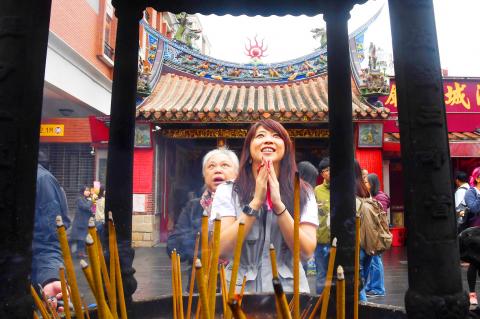Located in the heart of Taipei’s historic Dadaocheng (大稻埕) area, the Xia Hai City God Temple (霞海城隍廟) has become a must-see attraction thanks to the manager’s decades-long effort to preserve the temple and revitalize the community.
“When I travel abroad to promote tourism to the temple, I always invite people running businesses in the neighborhood to come along,” said 69-year-old Tracy Chen (陳文文), who has served as temple manager for 26 years.
When hosting travel shows abroad to introduce the temple to potential tourists, Chen takes the opportunity to showcase local delicacies, such as pastries, cakes and tea, she said.

Photo: CNA
Some people believe that the temple’s city god helps their businesses flourish, she said, adding: “However, it is ancestral workmanship that has left a rich cultural milieu and makes the temple an attractive destination.”
Following the sudden death of one of her brothers in 1994, Chen shouldered the temple’s managerial duties, making her the sixth generation to head the family-owned place of worship, which was built in 1859 on Dihua Street (迪化街), in what is now Datong District (大同).
The Ministry of the Interior in 1985 listed the temple as a historical monument. It is touted as one of Taipei’s “big three” temples, along with Baoan Temple (保安宮) in the same district and Wanhua District’s (萬華) Longshan Temple (龍山寺).
Although it is small, covering just 152m2, the temple has the highest density of statues in Taiwan, housing more than 600 deities in addition to the city god, his wife and the renowned matchmaking god, Chen said.
One of Chen’s many initiatives to revamp the Dadaocheng area, which saw its heyday as a major shipping port on the banks of the Tamsui River in the mid-19th century, is a twice-per-month group tour designed for people to explore the area’s history and culture.
Since the “Wandering Dadaocheng” project was launched in June 1997, more than 500 tours have been conducted, with experts in architecture and historical relics leading visitors on strolls through the alleyways steeped in history to understand Taipei’s past and experience the neighborhood’s mix of old and new.
The temple’s management was surprised that members of the public — and not just historians — have welcomed the tours so warmly.
The enthusiasm that the tours have generated for area preservation has helped keep the community’s collective memory alive, Chen said, adding that it has been a major push behind public and private refurbishment projects.
More than 70 community buildings have been awarded listed-building status by the Taipei City Government, she added.
“Thanks to decades of effort, we are proud to say that the Dadaocheng community is recognized as the nation’s best-preserved historical neighborhood,” she said.
International tourists visiting Taipei in 2017 ranked the Dadaocheng area as the third most-loved attraction, a survey released in October last year by the city’s Department of Information and Tourism showed.
The historic district is famous for century-old buildings of various styles that have been repurposed into shops selling products of time-honored workmanship, including tea, Chinese herbal medicine, dried goods and snacks, textiles and calligraphy brushes, alongside trendy venues that house cultural and creative industry start-ups.
“I was really touched when I recently came across a travel guide book in a Japanese hotel that juxtaposed photographs of Xia Hai City God Temple and Taipei 101,” Chen said. “That made me feel our efforts had not been in vain and that we must keep them up.”

The Ministry of Economic Affairs has fined Taobao NT$1.2 million (US$36,912) for advertisements that exceed its approved business scope, requiring the Chinese e-commerce platform to make corrections in the first half of this year or its license may be revoked. Lawmakers have called for stricter enforcement of Chinese e-commerce platforms and measures to prevent China from laundering its goods through Taiwan in response to US President Donald Trump’s heavy tariffs on China. The Legislative Yuan’s Finance Committee met today to discuss policies to prevent China from dumping goods in Taiwan, inviting government agencies to report. Democratic Progressive Party Legislator Kuo Kuo-wen (郭國文) said

The Ministry of Economic Affairs has fined Taobao NT$1.2 million (US$36,900) for advertisements that exceeded its approved business scope and ordered the Chinese e-commerce platform to make corrections in the first half of this year or its license would be revoked. Lawmakers have called for stricter supervision of Chinese e-commerce platforms and more stringent measures to prevent China from laundering its goods through Taiwan as US President Donald Trump’s administration cracks down on origin laundering. The legislature’s Finance Committee yesterday met to discuss policies to prevent China from dumping goods in Taiwan, inviting government agencies to report on the matter. Democratic Progressive Party

Taiwan and its Pacific ally Tuvalu on Tuesday signed two accords aimed at facilitating bilateral cooperation on labor affairs, according to Taiwan’s Ministry of Foreign Affairs (MOFA). The governments inked two agreements in Taipei, witnessed by Foreign Minister Lin Chia-lung (林佳龍) and visiting Deputy Tuvaluan Prime Minister Panapasi Nelesone, MOFA said in a news release. According to MOFA, the agreements will facilitate cooperation on labor issues and allow the two sides to mutually recognize seafarers’ certificates and related training. Taiwan would also continue to collaborate with Tuvalu across various fields to promote economic prosperity as well as the well-being of their

Sung Chien-liang (宋建樑), who led efforts to recall Democratic Progressive Party (DPP) Legislator Lee Kun-cheng (李坤城), was released on bail of NT$80,000 today amid outcry over his decision to wear a Nazi armband to questioning the night before. Sung arrived at the New Taipei District Prosecutors’ Office for questioning in a recall petition forgery case last night wearing a red armband bearing a swastika, carrying a copy of Adolf Hitler’s Mein Kampf and giving a Nazi salute. Sung left the building at 1:15am without the armband and covering the book with his coat. Lee said today that this is a serious